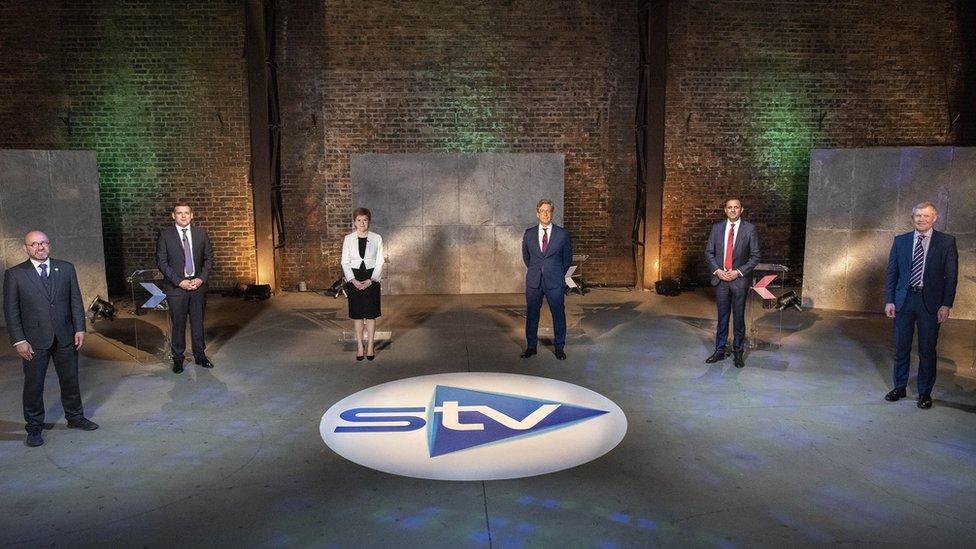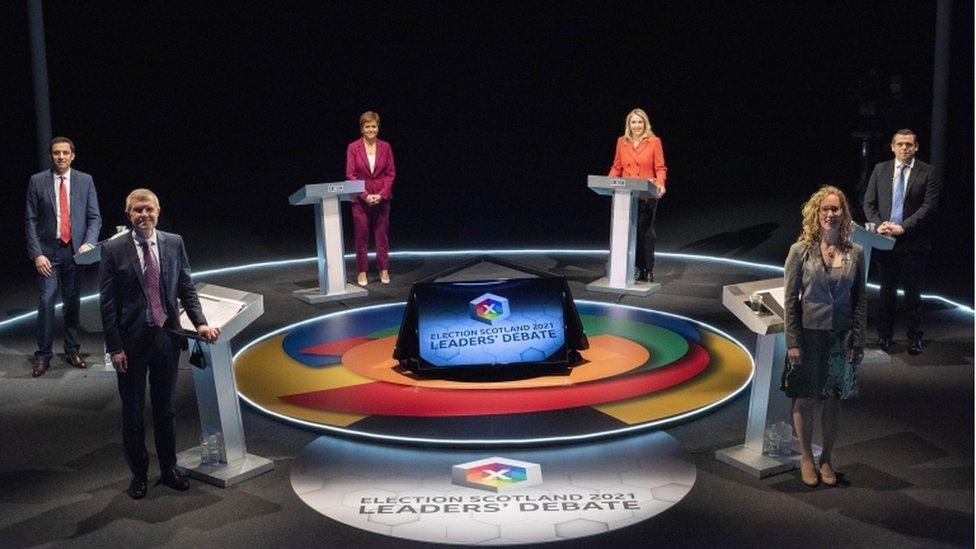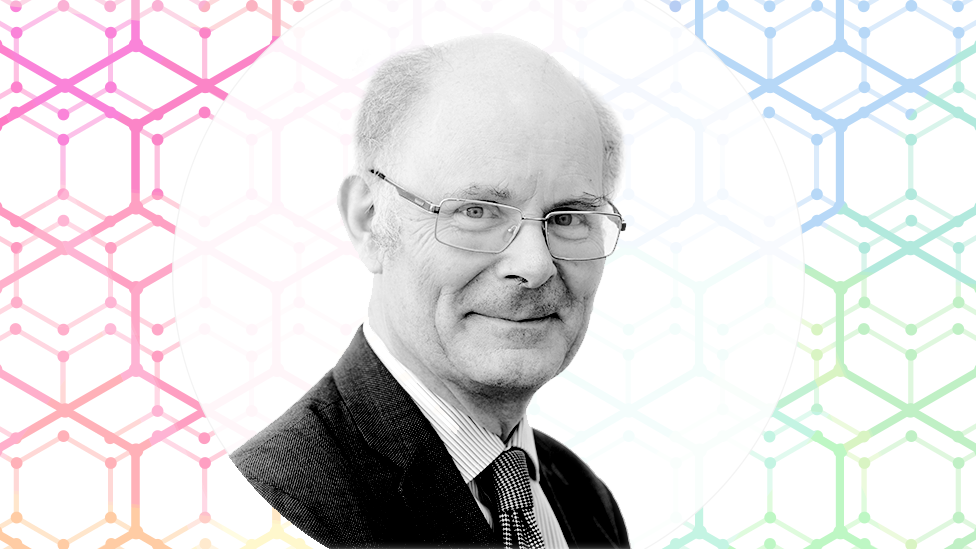Scottish election 2021: Scottish party leaders pitch Covid recovery plans
- Published

The leaders of Scotland's five main parties took part in the second pre-election debate
Scotland's political leaders clashed as they set out their Covid recovery plans in the second pre-election debate.
Patrick Harvie and Nicola Sturgeon said people should decide what a post-pandemic Scotland would look like through an independence referendum.
But their opponents described pursuing that campaign as "reckless" and "undermining" the Covid recovery.
Leaders also hinted about proposals for a universal basic income in forthcoming manifestos.
The televised debate saw Ms Sturgeon, the country's first minister, go head-to-head with Conservative leader Douglas Ross, Labour's Anas Sarwar, Liberal Democrat Willie Rennie and Greens co-leader Patrick Harvie.
The leaders were also given the chance to cross-examine each other on both campaign issues and past performance.
Nicola Sturgeon said she offered the "experienced leadership" needed to steer the country through the pandemic with a recovery plan that includes the establishment of a national care service.
She added that when the Covid crisis was over, her plans included the "choice of a better future" with an independence referendum.

SCOTLAND ALERTS: Get extra updates on BBC election coverage

When questioned by rival leaders, Mr Ross accused her of failing to meet promises made in key areas - and on Scotland's drug deaths she said her government "took our eye off the ball".
However, Ms Sturgeon said "progress" had been made in tackling the attainment gap in schools and NHS waiting times had been falling before Covid-19 hit.
'Picking fights'
Douglas Ross said Scotland should be electing MSPs who are "laser-focused on recovery", rather than campaigning for independence.
On the reopening of the economy, he said the data is telling us we can "cautiously reopen faster than planned", while his party's plans include ending the drug deaths crisis, putting more police officers on the streets and creating green jobs.
When Ms Sturgeon pressed Mr Ross on the impact of Brexit on Scotland's fishing industry, he accepted "we need to do far more" - but cautioned her against "picking fights" when the first minister asked if he did "whatever the UK government says".
Mr Ross was also accused of "prejudice" by Mr Harvie on the issue of gypsy travellers for previous comments promising tougher action against the community.
The Conservative leader said he had already apologised for those remarks, made some time ago, saying he should have answered the question "far better".


The Holyrood election campaign is back up and running, and the party leaders wasted no time in resuming hostilities in this debate.
Any idea that the temperature of the contest might have come down a bit during the enforced break after the death of Prince Philip was quickly dispelled.
There was a familiar constitutional theme to many of the exchanges, with leaders talking over each other about independence at almost every opportunity.
But there were also some hints about other policies which might be forthcoming in party manifestos.
Nicola Sturgeon and Anas Sarwar both dropped in mentions of universal basic income schemes. Douglas Ross talked about police numbers while Patrick Harvie brought up green jobs. Willie Rennie actually cited a specific number of heat pumps he wants to see installed in Scotland's homes.
We are almost halfway through the six-week election campaign, with postal ballots soon to be sent out, and there are times when it can still seem like the contest is in its infancy with well-worn arguments being repeated over and over.
But with all five of these parties publishing their manifestos in the coming week, there will be much more in the way of detailed policy to examine - and argue about - before long.

Patrick Harvie, who supports Scottish independence, said he wanted to implement a "fair and green" recovery with a focus on restoring nature, investment in public transport and warm homes.
He said one of things the Scottish government was unable to do was "fix the holes" in the furlough scheme or raise working standards and pay because those powers rested with Westminster.
Mr Harvie was questioned by Mr Sarwar on whether he was "waiting for independence" before using powers already available in Scotland to improve climate change.
He refuted the claim saying his party were "pushing government beyond their comfort zone", but pointed out Scotland was unable to take bigger steps such as regulating energy companies.
When pressed on his timetable for moving away from the oil and gas industry, Mr Harvie said: "We are the only political party to recognise that the world has about three times as much oil and gas as we can ever afford to burn. Over the next 10 years we should be investing in sustainable industries."

SCOTLAND'S ELECTION: THE BASICS
What's happening? On 6 May, people across Scotland will vote to elect 129 Members of the Scottish Parliament (MSPs). The party that wins the most seats will form the government. Find out more here.
What powers do they have? MSPs pass laws on aspects of life in Scotland such as health, education and transport - and have some powers over tax and welfare benefits.
Who can vote? Anyone who lives in Scotland, is registered to vote and aged 16 or over on 6 May is eligible. You can register to vote online, external.

Mr Sarwar reiterated his party's position that "we can't go back to old arguments" on the issue of a possible referendum, saying Labour wanted to restore education as well as the NHS and focus on children's mental health.
He also said he wanted to establish a national care service "with a focus on human rights" - but there had to be a mix between the public and private sectors.
The Labour leader was among those to hint at forthcoming proposals in manifestos when questioned by Ms Sturgeon about how to implement a universal basic income when we "don't have the powers".
Mr Sarwar did not give exact details but said he agreed with a basic income pilot and that Scotland could use existing powers to "create a minimum income guarantee".
And when Mr Harvie asked him if he was "too close" to the fossil fuel industry to be taken seriously on green commitments, he said: "We have got to make sure it's a truly just transition that doesn't decimate jobs."
'Dangerous issues'
Mr Rennie argued that the best Covid recovery plan was to cut mental health waiting times, help schools "bounce back" and to take action on the climate.
He said one key problem in schools has been the number of teachers leaving the profession because of a "mushrooming of casual contracts", which he said he would scrap and recruit permanent staff.
Mr Rennie faced pressure from both pro-independence leaders over the Lib Dems' approach to rejoining the EU without independence - to which he said he would like to "win people back over time".
He claimed Brexit was an example as to why breaking from the UK was not a good idea, adding: "These were dangerous issues, they needed to be handled with care. That's why we want to make sure we don't repeat the mistakes with independence."
When asked by Mr Sarwar if school pupils should be given a guaranteed resit following the "SQA exams fiasco", Mr Rennie said this was a "constructive proposal".


Do you have a question about the Scottish Parliament election? Use the form below to send us your questions and we could be in touch.
In some cases your question will be published, displaying your name, and location as you provide it, unless you state otherwise. Your contact details will never be published. Please ensure you have read the terms and conditions.
If you are reading this page on the BBC News app, you will need to visit the mobile version of the BBC website to submit your question on this topic.

- Published30 March 2021

- Published13 April 2021
